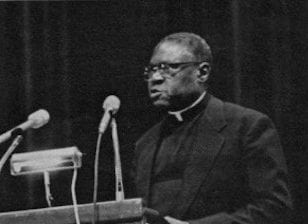JOSEPH JACKSON

Joseph Jackson was a prominent figure in the Civil Rights Movement and a dedicated advocate for social justice and equality. Born in Louisiana in 1898, Jackson moved to Chicago, Illinois as a young man and became a Baptist minister. He worked tirelessly to fight against segregation and inequality in Chicago and became a leader in the Southern Christian Leadership Conference (SCLC), working closely with Martin Luther King Jr. Reverend Jackson played a key role in organizing protests, sit-ins, and marches, and was instrumental in advocating for voting rights and desegregation in Chicago. He also played a significant role in the Chicago Freedom Movement, which aimed to challenge segregation and inequality in the city.
POSITIVE OR NEGATIVE RHETORICAL ACTION
Joseph Jackson was a close friend of Dr. King’s, and his tactics were essentially the same. Jackson advocated nonviolence which is visible in his speech about voting, as it mostly composes of nonviolent references. A key strategy for many Civil Rights activists was to organize and mobilize voters and voter registration, as many felt the way change was made was through elections. This speech analyzed by Jackson talks about just that, hence why the nonviolent acts were most prevalent throughout the speech.
"THE VOTE IS THE ONLY EFFECTIVE WEAPON IN THE CIVIL RIGHTS STRUGGLE"
In "The Vote is the Only Effective Weapon in the Civil Rights Struggle," Joseph Jackson argued that voting was the key to achieving meaningful change in society, and that Black people needed to use their voting power to elect officials who would work towards ending discrimination and segregation. He stressed the importance of organizing and mobilizing communities to register to vote and participate in the political process. Jackson's speech was significant because it emphasized the importance of voting as a means of achieving change, at a time when many Black people were being disenfranchised and denied their right to vote. His words continue to inspire and motivate people today, as the fight for voting rights and political power remains a crucial part of the struggle for racial justice and equality.
NETWORK GRAPH

Jackson's speech deals with voting, and his set/orgs references track as many of them relate to voting and the disenfranchisement of Black Americans at the time. Such references as Racists, Congressmen, Segregationists, all indicate disenfranchisement. The systemic racism and disenfranchisement Black voters face that Jackson mentions is visible with his references to the Founding Fathers, as disenfranchisement has existed since colonial times.